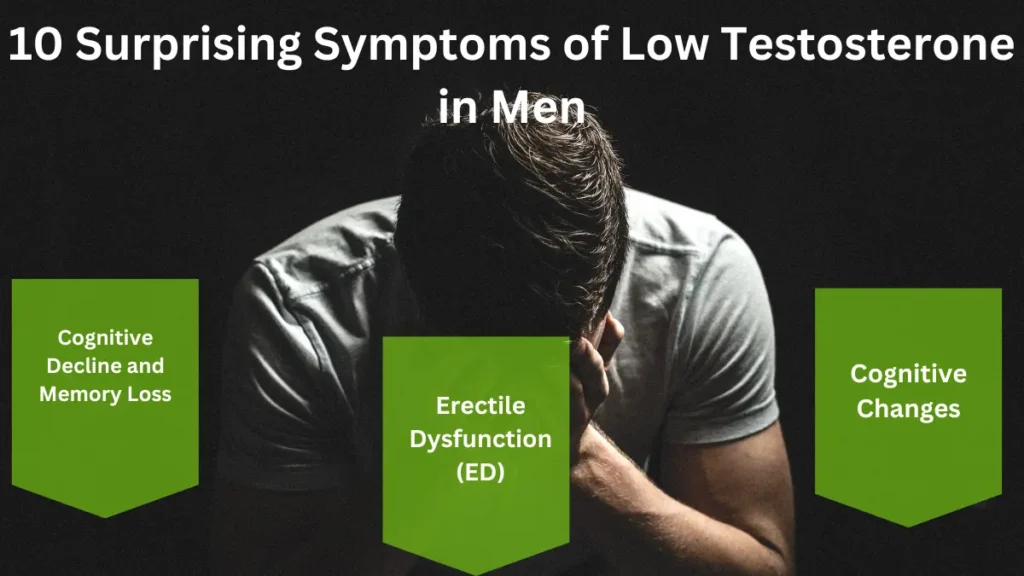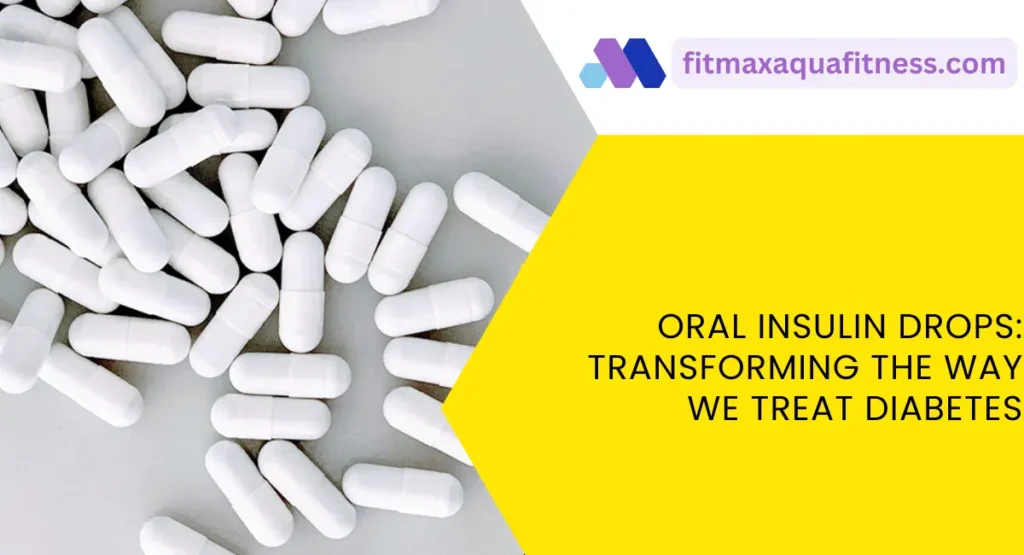Table of Contents
ToggleIntroduction
Testosterone is a crucial hormone for male health. It plays a significant role in male sexual development and overall well-being. In this article, we will explore 10 surprising symptoms that could indicate low testosterone levels in men. Early recognition and treatment of low testosterone are crucial because it can significantly impact various aspects of men’s health.
While many people know about the common symptoms of low testosterone, such as reduced sex drive and fatigue, there are also lesser-known signs that often go unnoticed. It’s important to highlight these subtle indicators to make sure that individuals have a complete understanding of the possible effects of low testosterone.

Lorem ipsum dolor sit amet, consectetur adipiscing elit. Ut elit tellus, luctus nec ullamcorper mattis, pulvinar dapibus leo.
1. Definition and Function of Testosterone
Testosterone is a male sex hormone that plays a crucial role in the development and maintenance of male characteristics. It is primarily produced in the testicles, although a small amount is also produced by the adrenal glands.
The function of testosterone goes beyond just sexual development. Here are some key points to understand:
- Sexual Development: Testosterone is responsible for the development of male reproductive tissues, such as the testes and prostate gland. It also plays a vital role in the development of secondary sexual characteristics, including facial and body hair growth, deepening of the voice, and increased muscle mass.
- Libido and Sexual Function: Testosterone is closely linked to sexual desire (libido) and erectile function. It stimulates the production of nitric oxide, which helps relax blood vessels in the penis, allowing for increased blood flow during arousal.
- Muscle and Bone Health: Testosterone plays a critical role in maintaining muscle mass and strength. It promotes protein synthesis, which aids in muscle repair and growth. Additionally, testosterone helps maintain bone density by stimulating bone mineralization and inhibiting bone resorption.
- Mood Regulation: Testosterone influences mood and well-being in men. Low testosterone levels have been associated with symptoms such as irritability, depression, fatigue, and reduced motivation.
- Metabolic Function: Testosterone contributes to metabolic processes such as fat metabolism and insulin sensitivity. Adequate testosterone levels help maintain a healthy body composition by promoting lean muscle mass while preventing excessive fat accumulation.
In summary, testosterone is a vital hormone for male health, encompassing various aspects of physical, sexual, and mental well-being. Its production primarily occurs within the testicles and influences sexual development, libido, muscle strength, bone health, mood regulation, and metabolism.
Understanding the Prevalence and Causes of Low Testosterone
Low testosterone, also known as testosterone deficiency or hypogonadism, is a common condition that affects many men, particularly as they age. Here are some key points to understand about the prevalence and causes of low testosterone:
1. Common among Aging Men
Low testosterone is more prevalent among older men. According to research, approximately 40% of men aged 45 and older have low blood testosterone levels. As men age, their testosterone production naturally declines, leading to potential symptoms of low testosterone.
2. Other Causes
While aging is a common cause of low testosterone, there are various other factors that can contribute to this condition. Some of the causes include:
- Testicle injuries
- Cancer treatments such as chemotherapy or radiation therapy
- Chronic illnesses like kidney disease or cirrhosis
- Pituitary gland conditions
- Obesity
- Certain medications
3. Association with Other Conditions
It’s worth noting that low testosterone levels may also be associated with conditions such as obesity and poorly managed type 2 diabetes. These conditions can impact hormone production and disrupt the balance of testosterone in the body.
Understanding the prevalence and causes of low testosterone is crucial for recognizing potential symptoms and seeking appropriate medical advice. In the next section, we will explore some common symptoms of low testosterone in men, as well as some lesser-known indicators that often go unnoticed.
Common Symptoms vs. Lesser-Known Indicators of Low Testosterone
When it comes to low testosterone, the common symptoms that most people are aware of include reduced sex drive, fatigue, and decreased muscle mass. However, it’s important to note that there are other subtle indicators that can also point to low testosterone levels. One of these lesser-known symptoms is irritability, which can often be overlooked or attributed to other factors. It’s essential to be aware of these less obvious signs as they could be early indicators of low testosterone and prompt further investigation.
1. Cognitive Decline and Memory Loss
One surprising symptom of low testosterone in men is cognitive decline and memory loss. While testosterone is often associated with sexual health and muscle mass, it also plays a crucial role in brain function. Research has shown that low testosterone levels can contribute to difficulties with memory, concentration, and cognitive function.
Men with low testosterone may experience:
- Forgetfulness
- Difficulty concentrating
- Mental fogginess
- Slower processing speed
These cognitive changes can have a significant impact on daily life and overall well-being. It’s important to note that while testosterone replacement therapy may help alleviate some of these symptoms, it is not a guaranteed solution for cognitive decline.
Understanding the link between low testosterone and cognitive function can help men recognize the potential signs of low testosterone beyond the more commonly known symptoms. If you are experiencing cognitive decline or memory loss, it may be worth discussing your symptoms with a healthcare professional to determine if low testosterone could be a contributing factor.
10 Surprising Symptoms of Zinc Deficiency in Women
2. Erectile Dysfunction (ED)
When it comes to symptoms of low testosterone in men, one surprising indicator is erectile dysfunction (ED). Testosterone plays a crucial role in male sexual function, including the ability to achieve and maintain an erection. Therefore, a decrease in testosterone levels can lead to difficulties with erections.
It’s important to note that ED can have multiple causes, and low testosterone is just one of them. However, if a man is experiencing persistent problems with erections, it may be worth considering low testosterone as a potential underlying factor.
Recognizing ED as a possible symptom of low testosterone is essential because it can often go overlooked. Many individuals assume that ED is solely related to age or psychological factors, but hormonal imbalances can also contribute to this issue.
By understanding the connection between testosterone and sexual function, individuals and healthcare professionals can identify the root cause of ED and provide appropriate treatment options. It’s crucial to address both the symptoms and underlying causes to improve overall sexual health and quality of life for men affected by low testosterone levels.
3. Cognitive Changes
When we think of symptoms of low testosterone, we often focus on physical changes like reduced sex drive or muscle loss. However, one surprising symptom that is often overlooked is cognitive changes. Testosterone plays a crucial role in brain function, and low levels can manifest in various cognitive impairments. Here are some cognitive changes that may indicate low testosterone in men:
- Memory decline: Low testosterone levels have been linked to memory problems, including difficulty remembering information or retaining new knowledge.
- Poor concentration: Men with low testosterone may find it challenging to concentrate or stay focused on tasks, leading to decreased productivity and performance.
- Mental fog: Some men experience a feeling of mental fogginess or confusion when their testosterone levels are low.
- Slower processing speed: Reduced testosterone can slow down cognitive processing speed, making it harder to think quickly and respond efficiently.
- Mood swings: Testosterone helps regulate mood, and low levels can result in increased irritability, depression, or anxiety.
It’s important to note that these cognitive changes can have a significant impact on a man’s quality of life and overall well-being. If you notice any of these symptoms, it’s essential to consult with a healthcare professional for proper diagnosis and treatment options.
Remember, recognizing the lesser-known indicators of low testosterone can lead to early intervention and improved overall health.
4. Decrease In Hemoglobin Levels.
Another surprising indicator of low testosterone is a decrease in hemoglobin levels. Testosterone plays a crucial role in stimulating the production of red blood cells in the bone marrow. Therefore, low levels of testosterone can lead to a reduction in hemoglobin, which may result in symptoms such as fatigue, weakness, and an overall decrease in energy levels. This lesser-known symptom of low testosterone highlights how hormonal imbalances can affect different parts of the body.
7 Common Alcohol-Based Mouthwash Side Effects to Watch Out For
5. Increase in Body Fat and Gynecomastia
Another surprising indicator of low testosterone is an increase in body fat, specifically in the chest area. This can result in the development of gynecomastia, a condition where male breast tissue becomes enlarged.
While this may not be commonly associated with low testosterone, it can be a significant sign of hormonal imbalance in men. Gynecomastia can cause emotional distress and may also indicate other underlying health issues that need to be addressed.
This symptom is often overlooked or attributed to other factors, but it’s important to recognize it as a potential indicator of low testosterone levels.
6.Increase in Body Fat and Difficulty Losing Weight
One surprising symptom of low testosterone in men is an increase in body fat and difficulty losing weight. Testosterone plays a crucial role in regulating metabolism and fat distribution in the body. When testosterone levels are low, it can lead to an increase in body fat, particularly around the abdomen area.
Here are some key points to consider regarding this symptom:
- Low testosterone levels can result in a decrease in muscle mass, which can lower the metabolic rate and make it harder for the body to burn calories.
- Men with low testosterone may notice an increase in belly fat and a decrease in muscle tone.
- This change in body composition can make it challenging for men to lose weight or maintain a healthy weight.
- It’s important to note that while low testosterone can contribute to weight gain, it is not the sole cause. Lifestyle factors such as poor diet and lack of exercise also play a role.
Understanding the connection between low testosterone and weight gain can help men recognize this symptom and seek appropriate treatment.
7. Decreased Facial and Body Hair Growth
One of the surprising symptoms of low testosterone in men is a decrease in facial and body hair growth. Testosterone plays a crucial role in stimulating hair follicles and promoting hair growth in various areas of the body, including the face, chest, and pubic region. When testosterone levels are low, this can lead to a noticeable reduction in the growth and thickness of facial and body hair.
Men with low testosterone may experience:
- A decrease in beard growth
- Sparse or patchy facial hair
- A slower rate of hair growth on the body
- Thinner or lighter hair on their arms, legs, and chest
It’s important to note that decreased facial and body hair growth can also be influenced by other factors such as genetics and age. However, if you notice a significant change in your hair growth patterns along with other symptoms of low testosterone, it may be worth discussing with your healthcare provider.
This symptom serves as another potential indicator of low testosterone levels in men, highlighting the importance of recognizing the diverse range of symptoms associated with this condition. Furthermore, recent studies have shed light on the association between low testosterone levels and certain medical conditions such as cardiovascular diseases, emphasizing the need for timely diagnosis and treatment.
8.Decreased Facial and Body Hair Growth
One surprising symptom of low testosterone in men is the reduction in facial and body hair growth. Testosterone plays a crucial role in stimulating the growth of hair follicles, and low levels of this hormone can lead to a noticeable decrease in facial hair, such as beard growth, as well as reduced body hair. This can be an unexpected indicator of low testosterone levels and may be particularly surprising for men who have always had a full beard or chest hair.
9. Decreased Facial and Body Hair Growth
One surprising symptom of low testosterone in men is a decrease in facial and body hair growth. Testosterone plays a crucial role in stimulating the growth of hair follicles, particularly in areas such as the face, chest, and pubic region. When testosterone levels are low, men may notice a significant reduction in the thickness and density of their facial hair, as well as slower growth overall.
This symptom can be particularly distressing for men who have always had a full beard or who take pride in their facial hair. It can also impact body hair growth, leading to less hair on the chest, arms, legs, and other parts of the body.
Additionally, low testosterone levels can also cause a loss of armpit and pubic hair. This can be a subtle but noticeable change for men who are accustomed to having hair in these areas.
It’s important to note that while a decrease in facial and body hair growth can be indicative of low testosterone, it can also be influenced by other factors such as genetics or aging. Therefore, it’s essential to consider this symptom alongside other signs of low testosterone and consult with a healthcare professional for an accurate diagnosis.
This surprising symptom serves as another reminder of the wide-ranging impact that low testosterone can have on various aspects of male health and well-being. By recognizing these lesser-known indicators, men can seek appropriate medical help and take steps towards improving their overall quality of life. Furthermore, understanding the underlying causes behind decreased facial and body hair growth is crucial, as it helps us differentiate between natural occurrences like aging or genetics from potential health issues related to testosterone deficiency. For instance, genetics can also play a role in hair growth patterns, and it is important to consider this aspect while evaluating the symptom.
Oral Insulin Drops: Transforming the Way We Treat Diabetes
10. Increased Risk of Osteoporosis or Weak Bones
Testosterone plays a crucial role in maintaining bone health and density in men. Therefore, one surprising symptom of low testosterone levels is an increased risk of osteoporosis or weak bones. While osteoporosis is commonly associated with women, men can also be affected by this condition.
Here are some key points to consider:
- Low testosterone levels can lead to decreased bone mineral density, making the bones more susceptible to fractures.
- Men with low testosterone may experience frequent fractures, especially in the hip, spine, and wrist.
- Weak bones can also lead to height loss and a stooped posture in men with low testosterone.
It’s important for men to be aware that osteoporosis is not just a female concern and that low testosterone levels can contribute to bone health issues. If you suspect you have low testosterone and are experiencing frequent fractures or notice changes in your posture, it’s essential to consult with a healthcare professional for proper diagnosis and appropriate treatment options.
Seeking Diagnosis and Treatment for Low Testosterone
When it comes to low testosterone, seeking a proper diagnosis is crucial. Here are key points to consider:
- Importance of Medical Advice and Diagnosis: It’s important to seek medical advice if you suspect low testosterone levels. Diagnosis is typically done through a blood test to measure serum testosterone levels.
- Diagnostic Criteria: Additionally, Testosterone Deficiency Syndrome serves as a diagnostic criterion for low testosterone.
- Treatment Options: When it comes to treatment, Testosterone Therapy stands out as the primary approach.
- FDA Regulations and Guidelines: However, it’s crucial to be aware of FDA regulations and guidelines governing its use, emphasizing the need for caution and supervision when undergoing this treatment.
Managing Low TestosteroneRemember this: “Holistically.”
Alternative Therapies
There are various alternative therapies that can help improve testosterone levels and alleviate symptoms, such as:
- Acupuncture
- Herbal supplements like ashwagandha and fenugreek
- Vitamin and mineral supplements including zinc and vitamin D
- Stress-reducing techniques like yoga and meditation
Lifestyle Changes
Making certain lifestyle modifications can also positively impact testosterone levels, including:
- Regular exercise, particularly strength training
- Healthy, balanced diet with adequate protein and essential fats
- Sufficient sleep and stress management
- Avoiding excessive alcohol consumption
- Achieving and maintaining a healthy weight
It’s important to note that while these alternative therapies and lifestyle changes can be beneficial, they should always be undertaken under medical guidance to ensure safety and effectiveness.
Conclusion
Low testosterone is a common issue that affects many men, especially as they age. Recognizing and addressing low testosterone is crucial for men’s well-being. Consult with a healthcare professional if you suspect low testosterone based on symptoms. Treatment options include testosterone replacement therapy (TRT) under medical supervision, but careful monitoring is necessary due to potential side effects. Alternative therapies and lifestyle changes can also help, but consult with a doctor for guidance. Addressing low testosterone can improve mood, energy levels, sexual function, muscle mass, and bone health. Take action early for better overall well-being. Seek help if you suspect low testosterone symptoms.
FAQs (Frequently Asked Questions)
What are some surprising symptoms of low testosterone?
Surprising symptoms of low testosterone may include changes in sleep patterns, decreased motivation or self-confidence, difficulty concentrating or remembering things, increased body fat, and even smaller or softer testicles. These less obvious symptoms can often be overlooked but may indicate low testosterone levels.
How common is low testosterone among aging men?
Low testosterone is relatively common among aging men. As men age, their testosterone levels naturally decline. However, not all aging men will experience low testosterone levels. It’s important for aging men to be aware of the potential symptoms and seek medical advice if they suspect they may have low testosterone.






